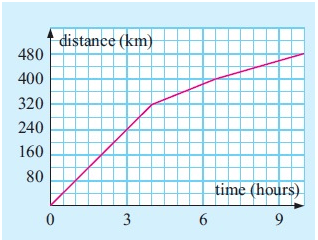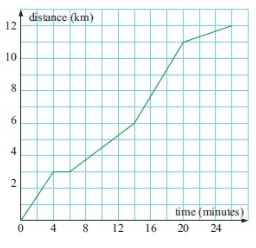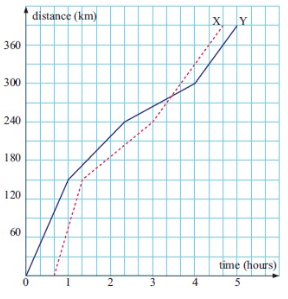DISTANCE TIME GRAPH QUESTIONS
Subscribe to our ▶️ YouTube channel 🔴 for the latest videos, updates, and tips.
Problem 1 :
The graph alongside indicates the distance a homing pigeon travelled from its point of release until it reaches its home.
Use the graph to determine:
a. The total length of the flight
b. The time taken for the pigeon to reach home
c. The time taken to fly the first 200 km
d. The time taken to fly the from the 240 km mark to the 400 km mark
e. The average speed for the first 4 hours
f. The average speed for the whole flight

Solution :
a. Length of flight is 480 km.
b. Time to reach home is 10 hours.
c. Time taken for 240 km = 3 hours
Time taken for 1 km = 3/240
Time taken for 200 km = (3/240) x 200
= 2.5 hours.
d. It takes 3 hours to fly 240 km. it takes 6 1/2 hours to fly 400 km.
It takes 3 1/2 hours to fly from 240 km to 400 km.
e. In the first 4 hours it flies 320 km
Average speed = 320/4 = 80 km per hour.
f. It travels a distance of 480 km In 10 hours
Average speed = 480/10 = 48 km per hour.
Problem 2 :
The graph alongside indicates the distance a cyclist must travel to work. Use the graph to determine:
a. The distance to work
b. The time taken to get to work
c. The distance travelled after
i) 10 minutes ii) 17 minutes
d. The time taken to travel
i. 6 km
ii.10 km
e. The average speed for the whole distance.

Solution :
a. The distance to work is 12 km.
b. Time taken to get to work is 26 km.
c.
i. The distance travelled after 10 minute is 4.5 km
ii. The distance travelled after 17 minute is 8.5 km
d.
i. The time taken to travel 6 km is 14 minutes
ii. The time taken to travel 10 km is 18.8 minutes
e.
Average speed = total distance covered/total time taken
= 12/26 × 60
= 27.7 km per hour
Problem 2 :
Two rally cars were involved in a handicap time trial. The distance time graph indicates how far each has travelled.
Use the graph to determine:
a. The handicap advantage given to car Y
b. The distance travelled by each car
c. How far both cars had travelled when car X caught car Y
d. How long it took each car to travel 300 km
e. How much faster X completed the time trial than Y
f. The average speed of each car.

Solution :
a. By considering the the graph horizontally Car Y starts its travelling at 0, but Car Y starts after 40 minutes
So, the handicap advantage given to car Y is 40 minutes.
b. The distance travelled by each car is 390 km.
c. Far of both cars is approximately 280 km.
d. X car : 3 hours
Y car : 4 hours
e. 1 hour faster X completed the time trial than Y.
f. X car :
Average speed = total distance covered/total time taken
= 390/4
= 97.5 km per hour
Y car :
Average speed = total distance covered/total time taken
= 390/5
= 78 km per hour
Subscribe to our ▶️ YouTube channel 🔴 for the latest videos, updates, and tips.
Recent Articles
-
Finding Range of Values Inequality Problems
May 21, 24 08:51 PM
Finding Range of Values Inequality Problems -
Solving Two Step Inequality Word Problems
May 21, 24 08:51 AM
Solving Two Step Inequality Word Problems -
Exponential Function Context and Data Modeling
May 20, 24 10:45 PM
Exponential Function Context and Data Modeling